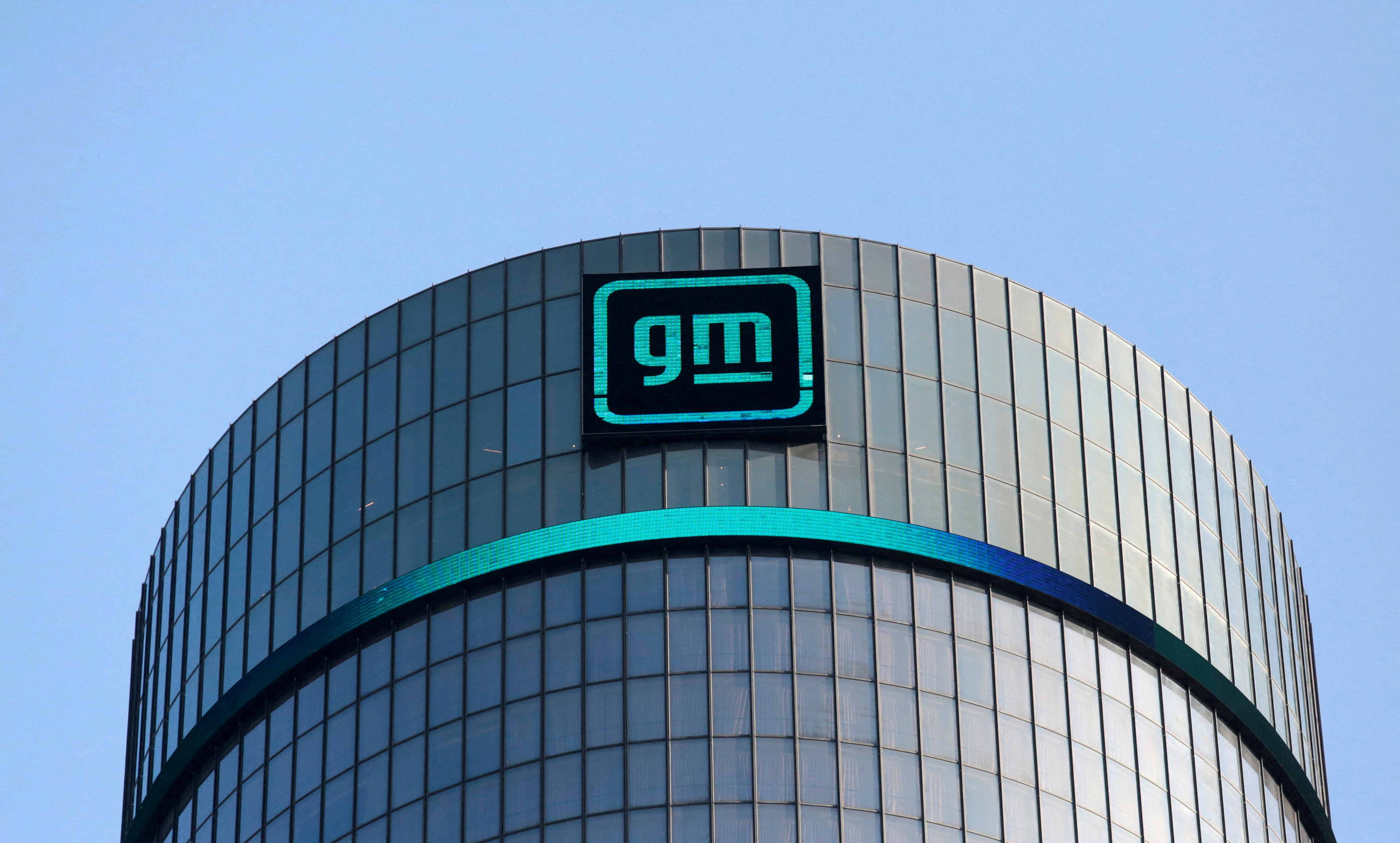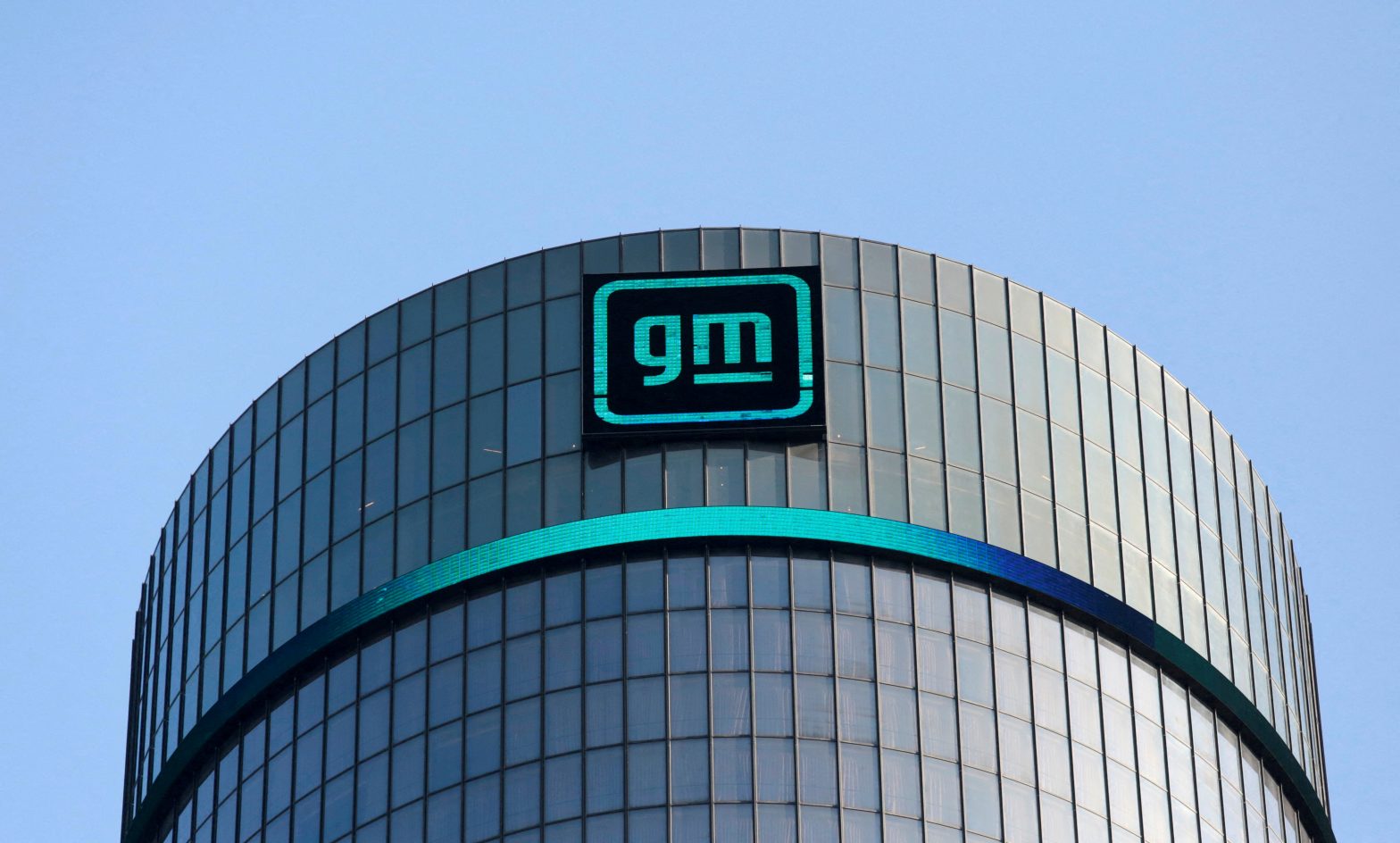
The GM logo is seen on the facade of the General Motors headquarters in Detroit, Michigan, U.S., March 16, 2021. Picture taken March 16, 2021. REUTERS/Rebecca Cook//File Photo Acquire Licensing Rights
DETROIT, Oct 24 (Reuters) – General Motors (GM.N) on Tuesday withdrew its previous guidance for 2023 profits and near-term electric vehicle production as costs related to the United Auto Workers strikes jumped to $200 million a week during October.
GM’s third-quarter net income fell 7.3% to $3.06 billion, while revenue rose 5.4% to $44.1 billion. The adjusted earnings per share tracked by analysts of $2.28 were ahead of Wall Street expectations, and up from $2.25 a year ago because of the effect of share buybacks.
GM shares rose 2.6% in premarket trading.
The rising toll of the UAW strikes, the outlook for higher labor costs once a new contract is reached, rising warranty expenses and an uncertain macro-economic outlook have forced GM to abandon previous targets for full-year financial performance that it had lifted in July.
The UAW walkouts cost the company $200 million during the third quarter and $600 million so far in the fourth quarter, GM Chief Financial Officer Paul Jacobson said in a briefing with reporters.
Strike costs are now running at $200 million a week, Jacobson said. He would not discuss the potential impact should UAW President Shawn Fain order new walkouts at GM’s most profitable North American factories such as the Arlington, Texas, plant that builds Cadillac Escalades and Chevrolet Suburbans, or the Flint, Michigan, heavy duty pickup assembly plant.
As the pace of EV sales growth has slowed in North America and even industry leader Tesla (TSLA.O) is expressing caution over the pace of its expansion, GM is shifting its EV strategy in the region.
The Detroit automaker will now accelerate production to meet customer demand and hit profit targets, rather than aiming for specific sales volume targets, Jacobson said.
GM is abandoning a goal of building 400,000 EVs from 2022 through mid-2024, he said.
GM CEO Mary Barra had reaffirmed that target in July, before the UAW strikes began consuming cash, at a time when GM had also raised its 2023 operating profit forecast to a range of $12 billion to $14 billion.
“We’re just not going to be talking about the interim production goals,” Jacobson said. “We want to make sure we’re balancing that against what we see out there. The real focus is getting to 1 million EVs of production by the end of 2025 alongside hitting our margin targets.”
Barra said in a shareholder letter on Tuesday that GM has “work to do” to hit its low- to mid-single digit earnings before interest and taxes (EBIT) margin target by 2025.
GM’s decision to delay retooling of a large factory in Orion Township, Michigan, to build electric pickup trucks will save $1.5 billion in capital investments in 2024, Jacobson said.
The delay to the electric truck expansion “will actually allow us to incorporate some of the changes and improvements that we’ve seen in early-stage production” and improve profit margins when the electric Silverados and GMC Sierras start production, he said.
The company has joined other automakers in urging the Biden administration to back away from ambitious emissions and fuel economy rules aimed at pushing EVs to two-thirds of the U.S. vehicle market by 2032.
So far, GM’s sales and pricing in North America have remained stable. Average selling prices for GM vehicles were $50,750 in the latest quarter, slightly down from the previous quarter.
Jacobson said GM executives are concerned about rising interest rates as well as the conflict in the Middle East and whether that could impact consumer behavior. But he did not echo Tesla CEO Elon Musk’s pessimism about the impact of rising interest rates on consumer demand.
“What I would tell you is that so far the consumer has held up remarkably well for us as evidenced by the average transaction prices,” Jacobson said.
GM also said losses at its Cruise robotaxi unit widened to $732 million in the quarter. GM said the losses were “in line with expectations” as operations expanded to 15 cities.
Reporting by Joe White; additional reporting by Ben Klayman; Editing by Jamie Freed, Kirsten Donovan
Our Standards: The Thomson Reuters Trust Principles.
